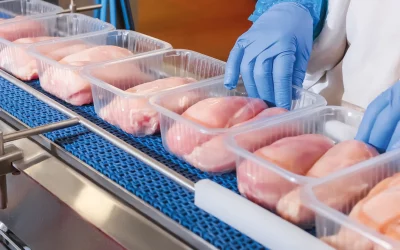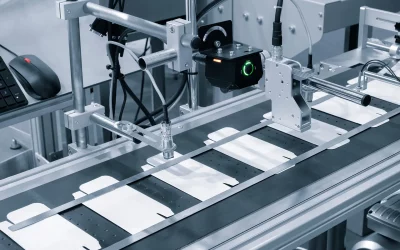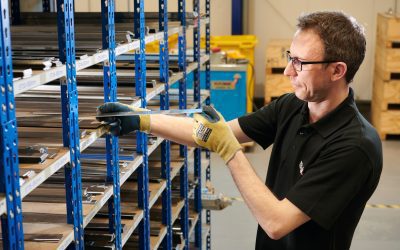What is thermoforming?
Before we delve into the details, we’ll begin with a definition; what exactly is thermoforming?
Thermoforming is a manufacturing process that involves heating a sheet of plastic until it reaches what’s called a ‘pliable forming temperature’.
Once this temperature has been reached, the plastic sheet is then formed into a specific shape using a mould.
Depending on the requirements of the packaging, the plastic sheet will be formed into the mould using one of the following methods:
- Vacuum forming – the plastic sheet is stretched over or into a female mould. Negative air pressure is then used to form the packaging.
- Plug assist forming – this process involves using a male plug tool to force the plastic sheet into the mould.
- Plug assist pressure forming – this process involves using a male plug tool, in addition to air vented underneath the plastic sheet to force it into the mould.
The shaped plastic is then trimmed to create the final product.
Many people have encountered thermoformed trays and packaging without even realising it.
Everything from coffee capsules, the blister packs of paracetamol, trays on which meat is packaged and more, are all thermoformed.
Thermoformed packaging is used throughout the food, pharmaceutical, electronics and other industries for good reason – it consistently produces high-quality packaging at low tooling costs.
What types of plastic are used in thermoforming?
In order to select the best machine knives for your thermoforming process, it’s important to know what type of plastic is going to be cut.
Cutting plastic has many challenges including the risk of cracking, burring, warping and distorting the material.
Below, we’ve set out six of the most common types of plastic that are used in industrial thermoforming processes:
- ABS plastic – formed of acrylonitrile, styrene and butadiene, ABS is a very tough plastic which is commonly used to create things like safety helmets etc.
- HIPS plastic – also known as polystyrene, HIPS plastic is ideal for creating food packaging such as clamshell containers, trays, bottles and disposable cutlery.
- HDPE plastic – HDPE (high-density polyethylene) is a stronger plastic with a high strength to density ratio. As a result HDPE tends to be used to create plastic bags and bottles.
- PVC plastic – PVC (polyvinyl chloride) is a hard, rigid plastic which can withstand strong impacts and temperature changes. As a result, PVC plastic is used for piping, flooring and more.
- PET plastic – one of the most commonly thermoformed plastics, PET (polyethylene terephthalate) is used in the production of bottles.
- PETG plastic – most commonly used to create blister packaging and trays, PETG (polyethylene terephthalate glycol-modified) is easily thermoformed, but care must be taken when cutting it.
As you can see, there are many different plastics which can be thermoformed – each with their own characteristics.
Of particular note, plastics which are commonly used to create packaging for the food, pharmaceutical and electronics industries such as PETG require careful cutting, as they can easily tear or warp if cut with poor quality machine knives.
Which brings us on to our next point…
What are thermoforming machine knives?
Put simply, thermoforming machine knives are knives which are designed to fit the most commonly used thermoforming machinery.
They are designed to fit the exact tolerances that are required by this type of machinery, as well as delivering consistent, high-quality cuts that produce finished packaging that is free from burrs, tears or any other form of damage.
As you would expect from a process which is used to create such a wide variety of packaging, thermoforming machine knives come in a wide array of types, including:
- Air punches/punching plugs.
- Europunch/bag handle punches.
- Flying knives.
- Full star punches.
- Half star punches.
- Punchlines.
- Snip snap blades.
Of course, you don’t want to buy generic versions of these machine blades. It’s vital that you buy thermoforming machine blades which possess the correct characteristics.
Failure to buy thermoforming machine blades with the correct characteristics can result in all kinds of negative results such as downtime due to blade failure, damage to your thermoforming machinery, damage to the thermoformed packaging and more.
What to look for in thermoforming machine blades
In this section, we’ll look at the characteristics that the very best thermoforming machine blades will have. Make sure that the blades you select possess these characteristics and you can be assured you’ll enjoy a smooth, reliable thermoforming process in your operations.
Quality manufacture
Above all else, you want to select thermoforming machine blades which have been designed and manufactured to the highest possible standards.
Whilst there are plenty of machine shops who claim they can create any type of blade, they lack the specialist experience and expertise required to fabricate blades which will provide long-lasting, reliable service.
It’s essential that you choose machine blades from a company that has a demonstrated expertise in producing thermoforming machine blades which are of the highest quality.
When working with a thermoforming machine blade supplier, you should check that their blades are:
- Manufactured from the highest-grade materials – be they tool steel, high-speed steel, carbon steel, stainless steel 420 or stainless steel 440.
- Available with a range of coatings such as PTFE, TiN, TiCN, electroless nickel plating or diamond-like carbon coating.
- Manufactured to OEM quality (or higher!).
Industry expertise
Aside from knowing the fundamentals required to manufacture high-quality blades, it’s essential that you select thermoforming machine knives that have been made by a company that truly understands your industry.
Each industry has its own requirements and nuances, for example thermoformed PETG plastic blister packs for pharmaceutical companies will require very different types of cuts than the cuts required for thermoformed HIPS plastic trays for food and beverage companies.
The blade supplier you select should understand this and be able to demonstrate that they’ve worked with customers in your industry.
Custom orders
Not all thermoforming machinery is the same. It’s essential that the blades you order are manufactured to the exact tolerances required by your machinery. Failure to do so can lead to blade failure, damage to machinery and expensive downtime.
That’s why it can be helpful to work with a supplier that can accommodate custom orders and manufacturer one-off blades if required.
Time for new thermoforming machine knives?
If you’re looking for new thermoforming machine knives for your machinery, then explore the range of knives available here at MRMK.
Since 2008, we’ve been manufacturing machine blades which exceed OEM quality, at a fraction of the price, delivering our blades quickly and exactly to your requirements.
With over 800 satisfied customers across 50 countries worldwide, we’re the go-to company for high-quality thermoforming machine knives.
Explore our range of thermoforming machine knives now
For more machine knife buying advice and information, read the MRMK News and Insights Hub…
Why Leading Brands Choose MRMK to Manufacture Their Machine Knives | Choosing the Right Cutting Tools for Your Food Processing Operations | How to Optimise the Performance of Your Packaging Blades


 +44 (0) 1909 519815
+44 (0) 1909 519815 


